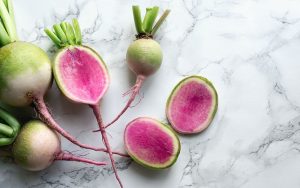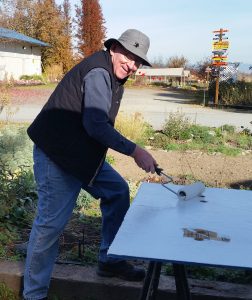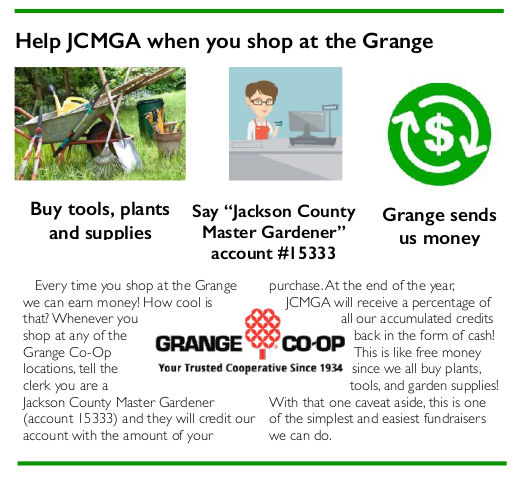This Rad is a Dish
 Sydney Jordan Brown MG 2000
Sydney Jordan Brown MG 2000
Nothing will dazzle your dinner salad or your dining guests like the ruby-fleshed root of the watermelon (also known as Beauty Heart or Red Meat) winter radish.
Although Raphanus sativus, the radish, is broadly distributed throughout the world, the winter variety may not yet have graced your garden and table.
Despite tentative speculations on this radish’s origins, the only true wild forms of this root are, well, rooted in Southeast Asia – as central China, Central Asia, and India seem secondary centers, given their differing-developed forms.
Even though radishes are recorded in the third century BC and detailed as crops by Greek and Roman agriculturists of the first century AD, they weren’t introduced here until the arrival of European immigrants.
The first varieties to reach our soils were likely familiar mild spring radishes. So it’s no wonder many people have never had the pleasure of sampling the red-fleshed winter radish.

There are spring radishes and then there are those spectacular winter varieties. They are in a whole other realm that evolved to enormous diameters, with dense interiors of the sweetest-crisp flesh in a profusion of color.
Like a watermelon, you’ll find sublimely sweet, but with a pleasant bite of heat. Greenish shoulders melt into white around a center that is saturated with a fluorescent shade of crimson. It also grows to a miraculous 4-5” in diameter, so there’s plenty to share to spice up any salad, stir fry, or appetizer offering.
Bright with flavor, this bold radish flourishes on the edge between summer’s last hurrah and the nip of Jack Frost’s first bite. It’s also loaded with antioxidants within those rosy interiors, vitamin C, fiber and almost no carbs if you’re counting such things.
So what’s the secret for this scarlet-fleshed radish’s stardom? It’s all in the setting. By building up the soil exuberantly with compost, this latent-maturing radish will rise to its finest performance.
Sow your seeds by selecting, if possible, a day below 90°F. That’s not always easy to do, but we who work the ground must watch the weather for cues on when to grow.
A thick blanket of fine mulch will be greatly appreciated by the plants and assist in keeping conditions consistently moist to encourage more rapid sprouting.
Once these babies have sprouted, they’ll need to be thinned to about 4-6” apart so they’ll have ample space to expand. Given their spicy temperament, these guys are little bothered with fly-by insect feasters.
Around October, you should be able to start sampling your first roots. The beauty of these radishes is their resistance to light frosts so you can leave them in the ground and enjoy them even through December in a milder year.
What a treat to taste such beauties long after the garden has been put to bed for the winter.
So if you’re looking for sighs of surprise, as well a splash of splendor for the eyes, set out for the prize of the red-flesh winter radish.
Seed Sources:
Baker Creek Heirloom Seeds
www.rareseeds.com
Pinetree Garden Seeds
www.superseeds.com
Johnny’s Select Seeds
www.johnnyseeds.com
Recipe: Winter Radish Salad
Vinaigrette
Juice and zest from 1 organic Valencia orange
1/4 cup organic cider vinegar
2 tablespoons honey
2 tablespoons Dijon mustard
2 peeled cloves garlic, pressed
1/4 cup extra virgin olive oil
2 teaspoon fresh rosemary, minced fine
1/8 teaspoon each fresh ground pepper and sea salt
Put all ingredients in a jar with a tight fitting lid and shake well to blend. Best made 24 hours ahead and can be refrigerated for about two weeks.
Salad
Vinaigrette
Juice and zest from 1 organic Valencia orange
1/4 cup organic cider vinegar
2 tablespoons honey
2 tablespoons Dijon mustard
2 peeled cloves garlic, pressed
1/4 cup extra virgin olive oil
2 teaspoon fresh rosemary, minced fine
1/8 teaspoons each fresh ground pepper and sea salt
Put all ingredients in a jar with a tight fitting lid and shake well to blend. Best made 24 hours ahead and can be refrigerated for about two weeks.
Salad
8 cups arugula, washed and drained
1 4” or 2 smaller, red meat radishes, washed and peeled then sliced paper thin (a mandoline is useful for this or thinnest slicing blade on food processor)
2 organic blood oranges, peeled and cut in lengthwise wedges then each cut in half again
4 fresh scallions, washed and cut in thin slices
8 pitted Kalamata olives, sliced
1/3 cup pistachio nuts
4 oz goat cheese
Put all ingredients (except goat cheese and nuts) in a large salad bowl, add about half vinaigrette then gently mix to coat everything. Sprinkle goat cheese and nuts over each serving. Serve immediately to 4-6 eager recipients.




 Sydney Jordan Brown MG 2000
Sydney Jordan Brown MG 2000





 John Kobal
John Kobal

 By Jane Moyer
By Jane Moyer
 Oregon State University Extension
Oregon State University Extension
